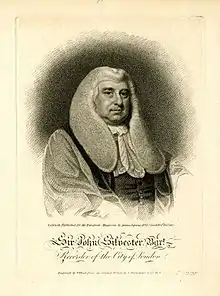John Silvester (lawyer)
Sir John Silvester, 1st Baronet (7 September 1745 – 30 March 1822), FRS, FSA, DCL, was an English lawyer and Common Serjeant of London from 1790 to 1803, and Recorder of London, the senior Circuit Judge at the Central Criminal Court (the Old Bailey), from 1803 until his death in 1822.[1]

Born in Yardley House in Chingford,[2] Silvester was the son of Sir John Baptist Silvester M.D., FRS (died 1789), of Dutch descent and physician to the army in the Low Countries, under the Duke of Cumberland during the War of the Austrian Succession.
In 1753 aged 8 John Silvester attended Merchant Taylors' School when James Townley was the Headmaster. He took part in the theatrical activities encouraged by Townley and was Head Monitor in 1761. He attended St John's College, Oxford from 1764 and took his BCL in 1771.[1] On qualifying in the Law he became a barrister at the Old Bailey.
Originally a City Common Pleader, in 1790 he was chosen by the City of London Corporation to take up the post of Common Serjeant of London, and, on the death of Sir John William Rose in 1803 he was appointed Recorder of London, the senior judge at the Old Bailey. As Common Serjeant Silvester was regarded as "uncouth and overly severe".[3]
He was elected a Fellow of the Royal Society in 1780; in 1804 he was elected a Fellow of the Society of Antiquaries and was appointed Steward of Southwark. Silvester was the Commissioner of the Court of Lieutenancy of the City of London. He was created a baronet on 27 December 1814,[1] and was awarded the DCL of the University of Oxford in 1818.
Silvester married twice, but had no children. On his death in 1822 his baronetcy passed to his nephew, Captain Philip Carteret Silvester, RN, CB. His body was taken from his home in Bloomsbury Square to be buried with his family at All Saints Church in Chingford in Essex. His bust was sculpted by Robert William Sievier and was displayed in the Old Bailey[4] but later moved to the Mansion House. He was succeeded as Recorder of London by Newman Knowlys.
In popular culture
- Silvester is mentioned, though does not appear, in Bernard Cornwell's novel Gallows Thief, during his tenure as Recorder of London and senior Circuit Judge, in 1817.
- Silvester was played by Aidan McArdle in the 2009-2011 BBC One television series Garrow's Law
References
- The Gentleman's Magazine and Historical Chronicle, Volume 92, Part 1 (1822) Google Books
- A History of the County of Essex: Volume 5 (1966) - British History Online
- May, Allyson N. The Bar & the Old Bailey, 1750-1850 The University of North Carolina Press (2003) pg 150 Google Books
- "Bust of John Silvester". Courtauld Institute.
External links
| Baronetage of the United Kingdom | ||
|---|---|---|
| New creation | Baronet (of Yardley) 1815–1822 |
Extinct |
| Baronet (of Yardley) 1822 |
Succeeded by Philip Carteret Silvester | |